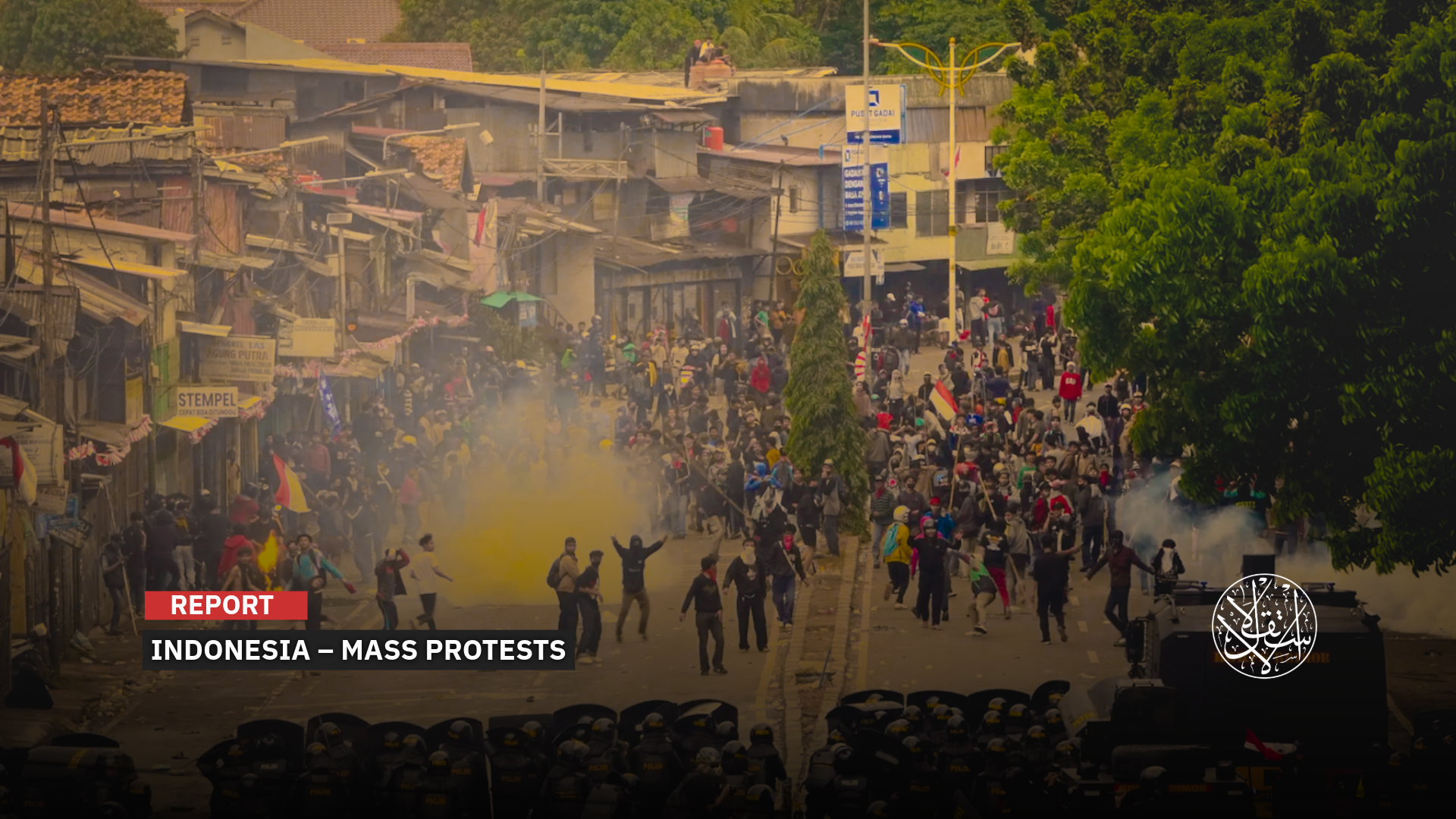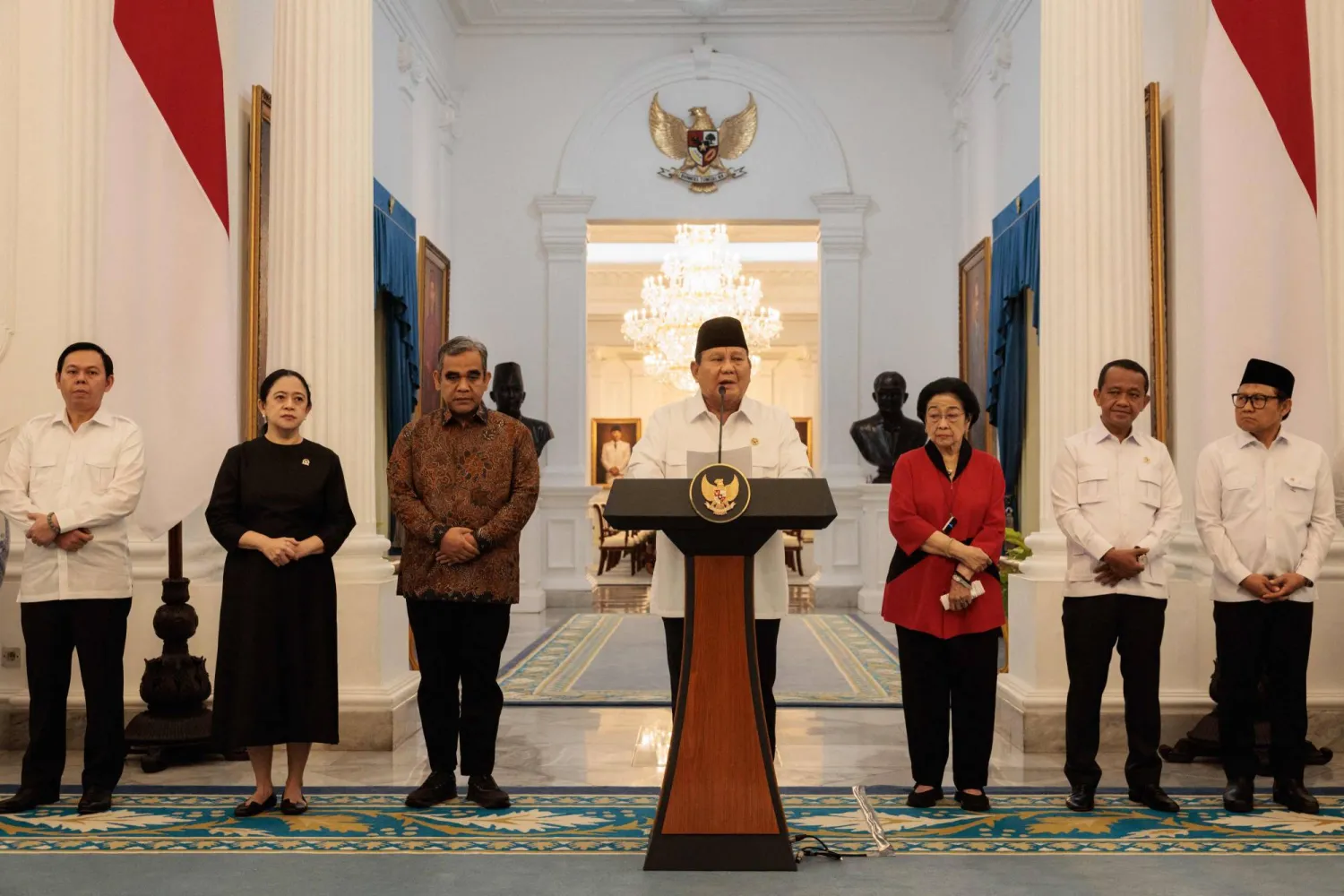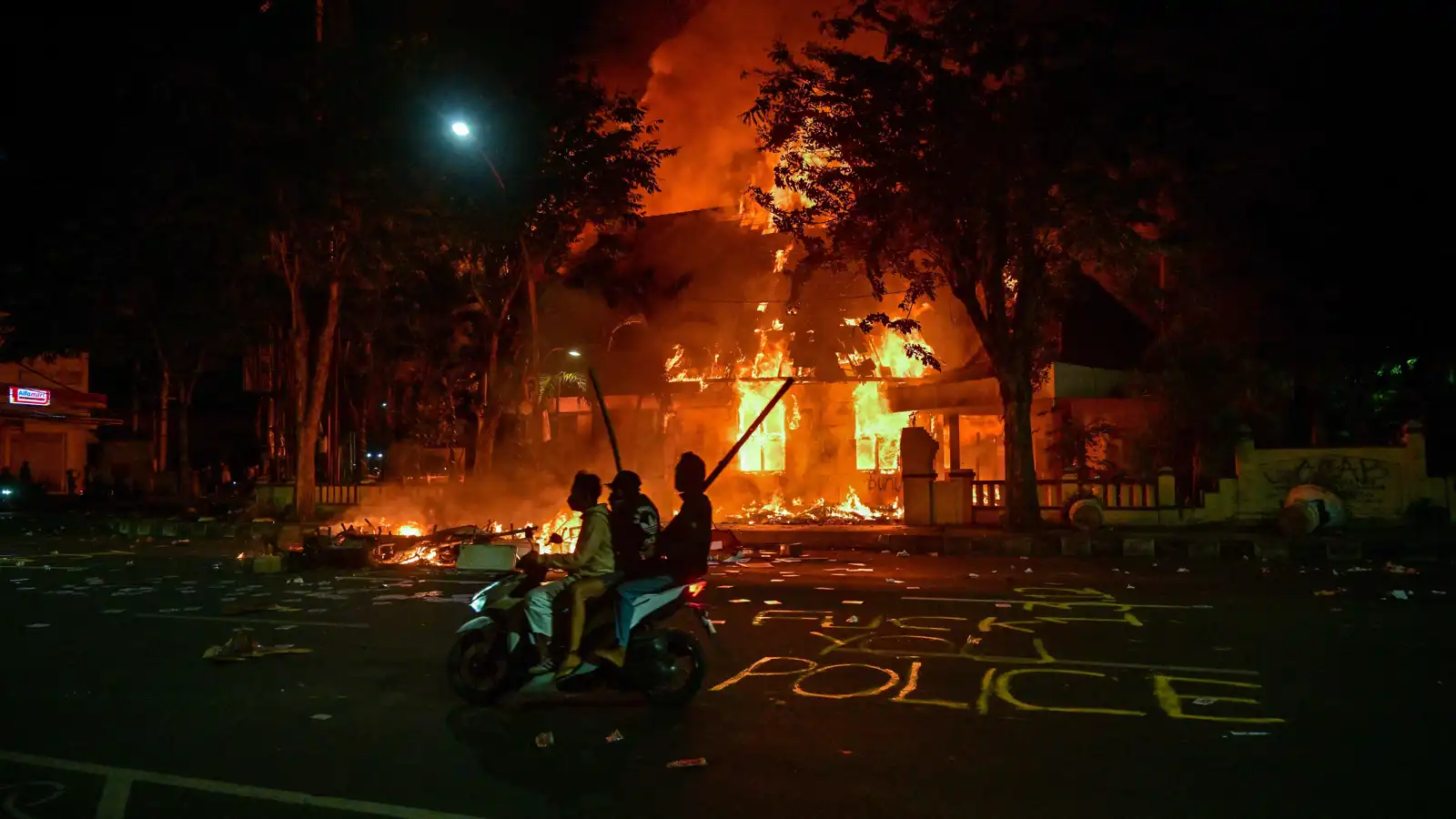How Indonesia's Parliamentary Perks Turned into Bloody Riots

“At least 10 people were killed during recent protests in Indonesia.”
Indonesia has been witnessing an unprecedented escalation of violence for nearly two weeks, as the authorities' measures have failed to calm the angry streets. This reflects the loss of trust between the public and the government, and raises fears of wider unrest.
As President Prabowo Subianto, 73, attempts to regain control, popular anger against his government is mounting over accusations of abuse of power, a decline in freedoms, and economic crises, amid fears of a return to authoritarian rule under the guise of a constitution.
The protests, the largest and most violent since Prabowo took office last October, have resulted in at least 10 deaths so far, according to human rights organizations, while police have announced they have arrested more than 1,240 people in Jakarta.
Protesters see no serious commitment to reform and transparency, while the government considers the demonstrations a threat to the country's stability. This deep division renders any attempt at calm superficial and ineffective.
Last February, thousands of Indonesians demonstrated against a massive government budget cut ordered by Prabowo to fund his populist policies, including a $1 billion free meals program.
Violent Protests
Peaceful protests erupted in the Indonesian capital, Jakarta, on August 25, following reports that all 580 members of the House of Representatives receive a monthly housing allowance of 50 million rupiah ($3,075), in addition to their salaries.
Local media reported that the member of parliament receives over 100 million rupiah ($6,150) per month, including housing allowances, a salary significantly higher than the average income of 3.1 million rupiah in Indonesia.
Critics argue that the perk isn’t only excessive, but also insensitive at a time when most people are grappling with a soaring cost of living, taxes and rising unemployment.
This popular anger coincided with tax increases, mass job cuts, unemployment, and inflation that disproportionately affected low-income Indonesians, sparking widespread discontent and growing economic pressure.
The protests grew wider and more violent on August 28, after a police armored vehicle struck and killed a 21-year-old food delivery driver, Affan Kurniawan.
The incident, which occurred during a demonstration in the capital, Jakarta, sparked widespread public outrage, especially after a video emerged showing the vehicle running over the young man without stopping.
The incident transformed the protests from economic demands to sharp criticism of police brutality, leading to the unrest spreading to major cities such as Bandung, Yogyakarta, and Makassar.
On August 29, Makassar, the capital of South Sulawesi province, witnessed bloody protests that left at least three people dead and five others injured after a provincial assembly building was set on fire.
On August 30, Indonesia witnessed an unprecedented wave of violence, as protesters set fire to the provincial parliament buildings in three provinces—West Nusa Tenggara, Pekalongan, and Cirebon—during mass demonstrations.
Protesters also stormed the provincial police headquarters in Surabaya, Indonesia's second-largest city, and set vehicles on fire.
Security forces and police responded with tear gas and water cannons to disperse the protesters in these provinces.
Protesters also burned bus stops and highway gates in Jakarta, while rallies continued in several locations.
That anger was stoked further when lawmakers mocked the protests, with one legislator calling those demanding the dissolution of parliament “the dumbest people in the world”.

Internal Division
Recent unrest in Indonesia forced President Prabowo Subianto to cancel a planned trip to China for a military parade commemorating the end of the Second World War.
In his first comments on the protests, Subianto apologized for the death of Affan after he was struck by a police armored vehicle during the recent protests.
He affirmed his commitment to holding the implicated police officer accountable, in an attempt to contain growing public anger toward the government.
Police leadership apologized to the family, announced that seven officers had been suspended, and confirmed they are under 20-day detention while being investigated.
Indonesian political parties have agreed to cut some lawmakers’ perks, including a controversial $3,000 housing allowance.
“Lawmakers will see certain allowances scrapped and overseas work trips suspended under a new moratorium,” said Prabowo, in a concession aimed at calming public anger.
He also met with labor unions to discuss amending labor laws and raising the minimum wage.
He added he had ordered the military and police to take firm action in response to the burning and looting of some politicians’ homes and state buildings.
Prabowo cautioned that violent acts risked veering into treason and terrorism, and warned the state would not tolerate attempts to destabilise the country.
Analysts believe that a large part of the crisis surrounding Indonesia's protests stems from the personality of President Subianto, whom his opponents accuse of seeking to strengthen the role of the military in civilian life at the expense of democratic institutions.
They note that Subianto, who served as defense minister before becoming president, is trying to present himself as a strongman capable of controlling chaos, but this approach is fueling mistrust.
In contrast, the opposition believes the solution lies in strengthening civil institutions and respecting the constitution, while the president asserts that military intervention is necessary to protect national security.
This deep divergence in positions deepens the political divide and increases tensions, threatening domestic stability.
On August 31, Defense Minister Sjafrie Sjamsoeddin warned that the army and police would take firm action against rioters and looters after the ransacking of Finance Minister Sri Mulyani Indrawati's home and the storming of the homes of three members of parliament.
Police later announced that President Prabowo had issued strict orders to confront what he described as chaos and violence.

Political Tensions
Indonesia, the world's fourth-largest economy with a population of 284 million, was once considered one of Southeast Asia's most stable.
However, the recent protests have triggered the worst crisis the country has experienced since Subianto took office nearly a year ago.
According to Jakarta authorities, losses from the recent riots amounted to approximately $3.4 billion.
Analysts noted that the violence and protests directly impacted financial markets.
The stock market recorded a significant decline, and the rupiah fell to record lows, compounding the burden on families already struggling with high living costs.
Reports indicated that foreign investors have begun withdrawing some of their capital, fearing continued political tensions.
This financial deterioration has strengthened the arguments of protesters who believe that the Subianto government has failed to protect the economy and provide stability.
On the other hand, media outlets and social media platforms have played a significant role in amplifying the voice of protesters and documenting the events of the Indonesian demonstrations.
Videos showing violent clashes between police and protesters have spread, contributing to increased public solidarity and the spread of protests to new cities.
The government has attempted to mitigate the influence of the media by imposing restrictions on some platforms, but these measures have failed to stop the spread of news, which has increased the protesters' sense of a cover-up and concealment of the truth.
Escalating violence in Indonesia prompted TikTok to voluntarily suspend its LIVE feature, citing measures to keep the platform a safe and civil space.

Possible Scenarios
In a related development, Indonesian students and civil society groups canceled protests planned for September 1 in Jakarta in response to the police handling of the protests.
Protest organizers cited concerns about heightened security measures following deadly riots across the country last week.
University students have long been considered vanguards of democracy in Indonesia, having played a leading role in the protests that helped oust former President Suharto in 1998.
On September 2, human rights organizations reported that approximately 20 people were still missing following the violent protests that swept the cities of Jakarta, Bandung, and Depok in recent days.
Police confirmed the arrest of activist Delpedro Marhaen, Executive Director of the Lokataru Foundation, on charges of inciting anarchy, a charge denounced by civil society organizations as an attempt to silence critical voices.
The United Nations called for an investigation into the alleged use of disproportionate force at the protests.
Human Rights Watch accused the Indonesian authorities of having acted irresponsibly by treating the protests as acts of treason or terrorism.
The rights group’s Asia director, Meenakshi Ganguly, said the response was especially concerning given the security forces' long history of using unnecessary and excessive force against demonstrators.
Foreign embassies and consulates, including the US, Australia, France, Canada, and other Southeast Asian countries, have issued travel warnings and advised their citizens in Indonesia to avoid demonstration areas or large public gatherings.

Political analyst Ibrahim Khatib told Al-Estiklal that there are several possible scenarios for Indonesia’s street protests.
“The first scenario is that the government succeeds in calming the situation through a comprehensive national dialogue and economic and political reforms,” he said.
“The second scenario is that the protests continue and expand, potentially leading to a profound governance crisis,” he added.
In a third scenario, Mr. Khatib did not rule out a larger military intervention if the government fails to control the situation, noting that such intervention could complicate matters rather than resolve them.
On the other hand, he noted that “the recent protests reveal a deeper frustration: almost three decades after the fall of the Suharto dictatorship, political and economic power remain in the hands of the elite.”
Sources
- Indonesia protests: president scraps lawmakers’ perks in bid to calm tensions
- What to know about Indonesia’s deadly nationwide unrest over lawmakers’ perks
- Military deployed in Indonesia's capital as thousands protest lavish perks for lawmakers
- Indonesia: End Crackdown on Protesters, Arbitrary Detention












